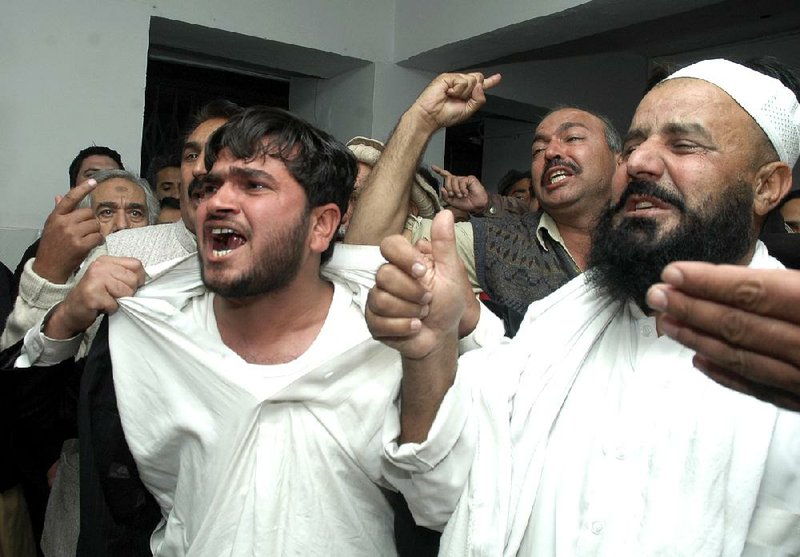PESHAWAR, Pakistan — The Pakistani Taliban claimed responsibility Saturday for a suicide bomb attack that killed a senior politician in northwest Pakistan who was one of the group’s most vocal critics. At least eight other people were killed in the attack and more than 15 others were wounded, senior government officials and doctors at a local hospital said.
The politician, Bashir Ahmad Bilour, was a senior minister in the northwestern Khyber-Pakhtunkhwa province, where the Taliban have a strong presence. Bilour was long on the target list of the Tehrik-i-Taliban Pakistan, an umbrella organization of the Pakistani militant groups, for publicly denouncing them and challenging their violent policies.
Bilour was coming out of a meeting of his Pashtun nationalist Awami National Party in the provincial capital of Peshawar, when the suicide bomber blew himself up, said the secretary of home and tribal affairs, Azam Khan.
Bilour had been taken to the hospital in critical condition, said Dr. Arshad Javed, chief executive of the city’s Lady Reading Hospital.
Among those killed were Bilour’s secretary and a police officer, Khan said.
The provincial information minister, Mian Iftikhar Hussain, called for immediate action against militants in the nearby tribal region of North Waziristan, the safest haven for militants in Pakistan, saying it was time to take action against all militants. “Let there be no difference between good Taliban and bad Taliban,” he said.
A security analyst, Asad Munir, a retired brigadier, said the attack would further complicate campaigning in Khyber-Pakhtunkhwa province for a national election expected next year.
He said secular, liberal and nationalist parties would have a difficult time because they are on the Taliban hit list, and that, “Religious parties will take advantage of the situation.”
Also Saturday, police officials in the southern province of Sindh said a mob had tortured and killed a man accused of burning the Koran, the latest in a series of violent episodes in Pakistan stemming from allegations of blasphemy.
The killing occurred Friday in Seeta, a remote village in the Dadu district in southern Sindh province. The village’s head cleric, Usman Memon, said charred remnants of the Koran had been found in the mosque that morning, and that the victim had been staying at the mosque alone. It is common for impoverished travelers and religious proselytizers to stay at mosques while traveling.
The man, whose name was not known, was handed over to the police and accused of violating Pakistan’s blasphemy laws, Memon said.
But as news of the episode spread later Friday, an angry crowd gathered outside the police station and eventually forced its way in. The man was dragged out, tortured and killed, and his body was set on fire, the police said.
Usman Ghani, the district’s senior police superintendent, said he had suspended the official in charge of the police station and filed administrative charges against seven other officers for negligence.
He said charges had been filed against 1,000 people believed to have participated in the mob action and that 150 people had been arrested.
Little was known about the victim or what motive he was thought to have had for burning the Koran, if he did so.
Meanwhile, a German aid worker abducted in Pakistan 11 months ago was seen alive in a video broadcast Saturday urging authorities to fully meet his captors’ demands, warning that otherwise they could kill him within days.
The undated video - probably recorded under duress by his captors - was broadcast Saturday by Pakistan’s Dunya TV. The German Foreign Ministry in Berlin said it “knows the case” and is aware of the video. A duty spokesman declined to elaborate.
The aid worker, identifying himself in the video as 59-year-old Bernd Muehlenbeck, said he was captured by mujahedeen - a generic term for militant Islamic extremists - but didn’t specify who they were or what their demands were.
In the message - which was likely to have been dictated by the captors - he said he was kidnapped “by mujahedeen because of the bad policies of the German government.”
He said he could be killed by his captors at any time. “We don’t know when. Maybe today, maybe tomorrow, maybe in three days.” Information for this article was contributed by Zia ur-Rehman of The New York Times; and by Juergen Baetz and Zarar Khan of The Associated Press.
Front Section, Pages 9 on 12/23/2012
